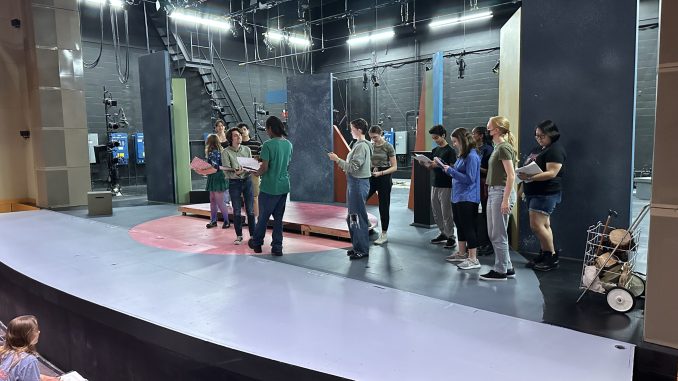
Details
Article by Marie Sykes <masykes@ursinus.edu>
Journey back in time all the way to Shakespeare… and then jump ahead almost four hundred years to the 1960s to see The Two Gentlemen of Verona, a Shakespeare comedy performed live at the Lenfest Theatre, directed by Dominick Scudera, Professor of Theater.
The Two Gentlemen of Verona consists of a messy love story between four people: Valentine, Proteus, Julia, and Silivia. It is set in the 1960s but maintains its original Shakespearean language. Evan Chartock ’25, Valentine, said that the “words become a challenge” when reading and performing the play, but “the emotions are a lot of times easier to decipher than regular plays. So once you get past the language, it becomes more straightforward than most people would like to believe.” Amelia Reaume ’27, Outlaw 3, said that she was excited to see it “all come together with the soundtrack and completed set and costumes.” Sadie Walker ’25, Julia, admits that the Shakespearean language does make this a “completely different kind of show,” and that same “dramatized English helps [her] feel more connected to the dramatic” role she plays.
When the cast was asked what their favorite parts of the show were, Chartock answered with their opening to Act II (with Shakespeare’s original five acts being divided into a final two), since he thought it was “a good creative divergence” for Valentine. Lauren MacAllister ’27, Outlaw 2, also loves the beginning of Act II when the audience first meets the Outlaws, who come on stage playing music with “no real tune… everyone is following their own tune.” She added that this has been a “really fun experience” for her first Ursinus show. Keelyn Fitzgerald ’27, the puppeteer of a dog named Crab, said that she may be “biased” but she enjoys her scenes between Crab and his owner, Lance, “because we’re the comic relief.” Reaume also favored Crab.
Annie Zulick 25, Silivia, said her favorite parts were a series of “little non-speaking bits near the beginning” and “how exaggerated and silly they all are.” She also “loved being able to really get into the language” while preparing for the show over the summer. “Every word has a reason and a meaning that I may not have known unless I did this play or looked into it on my own,” she told us. Walker said that her favorite part was “all of it” and commented that the audience can truly see Julia “growing up” throughout, and that she is “extremely dramatic and a teenager in love.” She did mention that her scenes with Lucetta really allow “Julia [to feel] comfortable and [let] her real personality shine.”
The play does come with some challenges of its own. Joey Nolan ’24, Proteus, said he enjoyed “getting to be sneaky and mischievous” and that “villains are more fun [and interesting] to play than good guys.” He did point out that it was difficult to portray Proteus and finding the balance between “mak[ing] the audience not hate him because he still gets a happy ending at the end… justify[ing] the things he does in his own head to play the character is very hard.” He sees Proteus here as not “intentionally evil” though “definitely not a good guy.” On Fitzgerald’s end, physically portraying her character was difficult as she does portray a dog… via puppeteering. “I’ve never done this before,” she said about puppeteering.
The ending has been edited for content, something very common for directors with this play. Walker and Zulick commented on what it meant for their characters, the female leads, without revealing the exact ending. Zulick said it was a “good, classic, nice ending” but expressed frustration with a lack of “justice” Silvia sees in the play. “Silvia is wronged by Proteus and she gets no apologies,” she commented, though that may have changed since then since the ending edits were not complete at the time of interviews. Walker said Scudera’s edits make her “like the ending of Julia and Proteus more” and it “makes more sense.” Walker added that “Julia matures throughout the play, and I feel honored to share this journey with the audience.”
When actors were asked to share what they wanted the audience to know before the performance, Nolan said to “be ready for Shakespeare. It’s very Shakespeare. It’s super silly” but not “old dramatic Shakespeare,” which MacAllister also told us not to think of. “It’s meant to make people laugh,” Nolan said. “It has a good story that everyone should come see.”
The play will be performed on September 28, 29, and 30th at 7:30pm as well as October 1 at 2pm (which will also offer an ASL-Interpreter). Go check out what will happen with this team of lovesick teenagers, a puppet, outlaws, crew members, and others!
